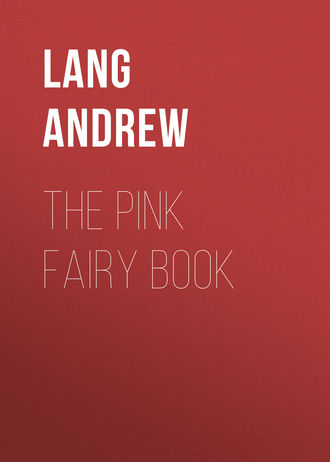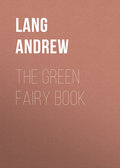
Lang Andrew
The Pink Fairy Book
Maiden Bright-eye
From the Danish
Once, upon a time there was a man and his wife who had two children, a boy and a girl. The wife died, and the man married again. His new wife had an only daughter, who was both ugly and untidy, whereas her stepdaughter was a beautiful girl, and was known as Maiden Bright-eye. Her stepmother was very cruel to her on this account; she had always to do the hardest work, and got very little to eat, and no attention paid to her; but to her own daughter she was all that was good. She was spared from all the hardest of the housework, and had always the prettiest clothes to wear.
Maiden Bright-eye had also to watch the sheep, but of course it would never do to let her go idle and enjoy herself too much at this work, so she had to pull heather while she was out on the moors with them. Her stepmother gave her pancakes to take with her for her dinner, but she had mixed the flour with ashes, and made them just as bad as she could.
The little girl came out on the moor and began to pull heather on the side of a little mound, but next minute a little fellow with a red cap on his head popped up out of the mound and said:
‘Who’s that pulling the roof off my house?’
‘Oh, it’s me, a poor little girl,’ said she; ‘my mother sent me out here, and told me to pull heather. If you will be good to me I will give you a bit of my dinner.’
The little fellow was quite willing, and she gave him the biggest share of her pancakes. They were not particularly good, but when one is hungry anything tastes well. After he had got them all eaten he said to her:
‘Now, I shall give you three wishes, for you are a very nice little girl; but I will choose the wishes for you. You are beautiful, and much more beautiful shall you be; yes, so lovely that there will not be your like in the world. The next wish shall be that every time you open your mouth a gold coin shall fall out of it, and your voice shall be like the most beautiful music. The third wish shall be that you may be married to the young king, and become the queen of the country. At the same time I shall give you a cap, which you must carefully keep, for it can save you, if you ever are in danger of your life, if you just put it on your head.
Maiden Bright-eye thanked the little bergman ever so often, and drove home her sheep in the evening. By that time she had grown so beautiful that her people could scarcely recognise her. Her stepmother asked her how it had come about that she had grown so beautiful. She told the whole story – for she always told the truth – that a little man had come to her out on the moor and had given her all this beauty. She did not tell, however, that she had given him a share of her dinner.
The stepmother thought to herself, ‘If one can become so beautiful by going out there, my own daughter shall also be sent, for she can well stand being made a little prettier.’
Next morning she baked for her the finest cakes, and dressed her prettily to go out with the sheep. But she was afraid to go away there without having a stick to defend herself with if anything should come near her.
She was not very much inclined for pulling the heather, as she never was in the habit of doing any work, but she was only a minute or so at it when up came the same little fellow with the red cap, and said:
‘Who’s that pulling the roof off my house?’
‘What’s that to you?’ said she.
‘Well, if you will give me a bit of your dinner I won’t do you any mischief,’ said he.
‘I will give you something else in place of my dinner,’ said she. ‘I can easily eat it myself; but if you will have something you can have a whack of my stick,’ and with that she raised it in the air and struck the bergman over the head with it.
‘What a wicked little girl you are!’ said he; ‘but you shall be none the better of this. I shall give you three wishes, and choose them for you. First, I shall say, “Ugly are you, but you shall become so ugly that there will not be an uglier one on earth.” Next I shall wish that every time you open your mouth a big toad may fall out of it, and your voice shall be like the roaring of a bull. In the third place I shall wish for you a violent death.’
The girl went home in the evening, and when her mother saw her she was as vexed as she could be, and with good reason, too; but it was still worse when she saw the toads fall out of her mouth and heard her voice.
Now we must hear something about the stepson. He had gone out into the world to look about him, and took service in the king’s palace. About this time he got permission to go home and see his sister, and when he saw how lovely and beautiful she was, he was so pleased and delighted that when he came back to the king’s palace everyone there wanted to know what he was always so happy about. He told them that it was because he had such a lovely sister at home.
At last it came to the ears of the king what the brother said about his sister, and, besides that, the report of her beauty spread far and wide, so that the youth was summoned before the king, who asked him if everything was true that was told about the girl. He said it was quite true, for he had seen her beauty with his own eyes, and had heard with his own ears how sweetly she could sing and what a lovely voice she had.
The king then took a great desire for her, and ordered her brother to go home and bring her back with him, for he trusted no one better to accomplish that errand. He got a ship, and everything else that he required, and sailed home for his sister. As soon as the stepmother heard what his errand was she at once said to herself, ‘This will never come about if I can do anything to hinder it. She must not be allowed to come to such honour.’
She then got a dress made for her own daughter, like the finest robe for a queen, and she had a mask prepared and put upon her face, so that she looked quite pretty, and gave her strict orders not to take it off until the king had promised to wed her.
The brother now set sail with his two sisters, for the stepmother pretended that the ugly one wanted to see the other a bit on her way. But when they got out to sea, and Maiden Bright-eye came up on deck, the sister did as her mother had instructed her – she gave her a push and made her fall into the water. When the brother learned what had happened he was greatly distressed, and did not know what to do. He could not bring himself to tell the truth about what had happened, nor did he expect that the king would believe it. In the long run he decided to hold on his way, and let things go as they liked. What he had expected happened – the king received his sister and wedded her at once, but repented it after the first night, as he could scarcely put down his foot in the morning for all the toads that were about the room, and when he saw her real face he was so enraged against the brother that he had him thrown into a pit full of serpents. He was so angry, not merely because he had been deceived, but because he could not get rid of the ugly wretch that was now tied to him for life.
Now we shall hear a little about Maiden Bright-eye When she fell into the water she was fortunate enough to get the bergman’s cap put on her head, for now she was in danger of her life, and she was at once transformed into a duck. The duck swam away after the ship, and came to the king’s palace on the next evening. There it waddled up the drain, and so into the kitchen, where her little dog lay on the hearth-stone; it could not bear to stay in the fine chambers along with the ugly sister, and had taken refuge down here. The duck hopped up till it could talk to the dog.
‘Good evening,’ it said.
‘Thanks, Maiden Bright-eye,’ said the dog.
‘Where is my brother?’
‘He is in the serpent-pit.’
‘Where is my wicked sister?’
‘She is with the noble king.’
‘Alas! alas! I am here this evening, and shall be for two evenings yet, and then I shall never come again.’
When it had said this the duck waddled off again. Several of the servant girls heard the conversation, and were greatly surprised at it, and thought that it would be worth while to catch the bird next evening and see into the matter a little more closely. They had heard it say that it would come again.
Next evening it appeared as it had said, and a great many were present to see it. It came waddling in by the drain, and went up to the dog, which was lying on the hearth-stone.
‘Good evening,’ it said.
‘Thanks, Maiden Bright-eye,’ said the dog.
‘Where is my brother?’
‘He is in the serpent-pit.’
‘Where is my wicked sister?’
‘She is with the noble king.’
‘Alas! alas! I am here this evening, and shall be for one evening yet, and then I shall never come again.’
After this it slipped out, and no one could get hold of it. But the king’s cook thought to himself, ‘I shall see if I can’t get hold of you to-morrow evening.’
On the third evening the duck again came waddling in by the drain, and up to the dog on the hearth-stone.
‘Good evening,’ it said.
‘Thanks, Maiden Bright-eye,’ said the dog.
‘Where is my brother?’
‘He is in the serpent-pit.’
‘Where is my wicked sister?’
‘She is with the noble king.’
‘Alas! alas! now I shall never come again.’
With this it slipped out again, but in the meantime the cook had posted himself at the outer end of the drain with a net, which he threw over it as it came out. In this way he caught it, and came in to the others with the most beautiful duck they had ever seen – with so many golden feathers on it that everyone marvelled. No one, however, knew what was to be done with it; but after what they had heard they knew that there was something uncommon about it, so they took good care of it.
At this time the brother in the serpent-pit dreamed that his right sister had come swimming to the king’s palace in the shape of a duck, and that she could not regain her own form until her beak was cut off. He got this dream told to some one, so that the king at last came to hear of it, and had him taken up out of the pit and brought before him. The king then asked him if he could produce to him his sister as beautiful as he had formerly described her. The brother said he could if they would bring him the duck and a knife.
Both of them were brought to him, and he said, ‘I wonder how you would look if I were to cut the point off your beak.’
With this he cut a piece off the beak, and there came a voice which said, ‘Oh, oh, you cut my little finger!’
Next moment Maiden Bright-eye stood there, as lovely and beautiful as he had seen her when he was home. This was his sister now, he said; and the whole story now came out of how the other had behaved to her. The wicked sister was put into a barrel with spikes round it which was dragged off by six wild horses, and so she came to her end.:But the king was delighted with Maiden Bright-eye, and immediately made her his queen, while her brother became his prime minister.
The Merry Wives
From the Danish
There lay three houses in a row, in one of which there lived a tailor, in another a carpenter, and in the third a smith. All three were married, and their wives were very good friends. They often talked about how stupid their husbands were, but they could never agree as to which of them had the most stupid one; each one stuck up for her own husband, and maintained that it was he.
The three wives went to church together every Sunday, and had a regular good gossip on the way, and when they were coming home from church they always turned into the tavern which lay by the wayside and drank half a pint together. This was at the time when half a pint of brandy cost threepence, so that was just a penny from each of them.
But the brandy went up in price, and the taverner said that he must have fourpence for the half-pint.
They were greatly annoyed at this, for there were only the three of them to share it, and none of them was willing to pay the extra penny.
As they went home from the church that day they decided to wager with each other as to whose husband was the most stupid, and the one who, on the following Sunday, should be judged to have played her husband the greatest trick should thereafter go free from paying, and each of the two others would give twopence for their Sunday’s half-pint.
Next day the tailor’s wife said to her husband, ‘I have some girls coming to-day to help to card my wool there is a great deal to do, and we must be very busy. I am so annoyed that our watchdog is dead, for in the evening the young fellows will come about to get fun with the girls, and they will get nothing done. If we had only had a fierce watchdog he would have kept them away.’
‘Yes,’ said the man, ‘that would have been a good thing.’
‘Listen, good man,’ said the wife, ‘you must just be the watchdog yourself, and scare the fellows away from the house.’
The husband was not very sure about this, although otherwise he was always ready to give in to her.
‘Oh yes, you will see it will work all right,’ said the wife.
And so towards evening she got the tailor dressed up in a shaggy fur coat, tied a black woollen cloth round his head, and chained him up beside the dog’s kennel.’
There he stood and barked and growled at everyone that moved in his neighbourhood. The neighbour wives knew all about this, and were greatly amused at it.
On the day after this the carpenter had been out at work, and came home quite merry; but as soon as he entered the house his wife clapped her hands together and cried, ‘My dear, what makes you look like that? You are ill.’
The carpenter knew nothing about being ill; he only thought that he wanted something to eat, so he sat down at the table and began his dinner.
His wife sat straight in front of him, with her hands folded, and shook her head, and looked at him with an anxious air.
‘You are getting worse, my dear,’ she said; ‘you are quite pale now; you have a serious illness about you; I can see it by your looks.’
The husband now began to grow anxious, and thought that perhaps he was not quite well.
‘No, indeed,’ said she; ‘it’s high time that you were in bed.’
She then got him to lie down, and piled above him all the bedclothes she could find, and gave him various medicines, while he grew worse and worse.
‘You will never get over it,’ said she; ‘I am afraid you are going to die.’
‘Do you think so?’ said the carpenter; ‘I can well believe it, for I am indeed very poorly.’
In a little while she said again, ‘Ah, now I must part with you. Here comes Death. Now I must close your eyes.’ And she did so.
The carpenter believed everything that his wife said, and so he believed now that he was dead, and lay still and let her do as she pleased.
She got her neighbours summoned, and they helped to lay him in the coffin – it was one of those he himself had made; but his wife had bored holes in it to let him get some air. She made a soft bed under him, and put a coverlet over him, and she folded his hands over his breast; but instead of a flower or a psalm-book, she gave him a pint-bottle of brandy in his hands. After he had lain for a little he took a little pull at this, and then another and another, and he thought this did him good, and soon he was sleeping sweetly, and dreaming that he was in heaven.
Meanwhile word had gone round the village that the carpenter was dead, and was to be buried next day.
It was now the turn of the smith’s wife. Her husband was lying sleeping off the effects of a drinking bout, so she pulled off all his clothes and made him black as coal from head to foot, and then let him sleep till far on in the day.
The funeral party had already met at the carpenter’s, and marched oft towards the church with the coffin, when the smith’s wife came rushing in to her husband.
‘Gracious, man,’ said she, ‘you are lying there yet? You are sleeping too long. You know you are going to the funeral.’
The smith was quite confused; he knew nothing about any funeral.
‘It’s our neighbour the carpenter,’ said his wife, ‘who is to be buried to-day. They are already half-way to church with him.’
‘All right,’ said the smith, ‘make haste to help me on with my black clothes.’
‘What nonsense!’ said his wife, ‘you have them on already. Be off with you now.’
The smith looked down at his person and saw that he was a good deal blacker than he usually was, so he caught up his hat and ran out after the funeral. This was already close to the church, and the smith wanted to take part in carrying the coffin, like a good neighbour. So he ran with all his might, and shouted after them, ‘Hey! wait a little; let me get a hold of him!’
The people turned round and saw the black figure coming, and thought it was the devil himself, who wanted to get hold of the carpenter, so they threw down the coffin and took to their heels.
The lid sprang off the coffin with the shock, and the carpenter woke up and looked out. He remembered the whole affair; he knew that he was dead and was going to be buried, and recognising the smith, he said to him, in a low voice, ‘My good neighbour, if I hadn’t been dead already, I should have laughed myself to death now to see you coming like this to my funeral.’
From that time forth the carpenter’s wife drank free of expense every Sunday, for the others had to admit that she had fooled her husband the best.
King Lindorm
From the Swedish
There once lived a king and a queen who ruled over a very great kingdom. They had large revenues, and lived happily with each other; but, as the years went past, the king’s heart became heavy, because the queen had no children. She also sorrowed greatly over it, because, although the king said nothing to her about this trouble, yet she could see that it vexed him that they had no heir to the kingdom; and she wished every day that she might have one.
One day a poor old woman came to the castle and asked to speak with the queen. The royal servants answered that they could not let such a poor beggar-woman go in to their royal mistress. They offered her a penny, and told her to go away. Then the woman desired them to tell the queen that there stood at the palace gate one who would help her secret sorrow. This message was taken to the queen, who gave orders to bring the old woman to her. This was done, and the old woman said to her:
‘I know your secret sorrow, O queen, and am come to help you in it. You wish to have a son; you shall have two if you follow my instructions.’
The queen was greatly surprised that the old woman knew her secret wish so well, and promised to follow her advice.
‘You must have a bath set in your room, O queen,’ said she, ‘and filled with running water. When you have bathed in this you will find. under the bath two red onions. These you must carefully peel and eat, and in time your wish will be fulfilled.’
The queen did as the poor woman told her; and after she had bathed she found the two onions under the bath. They were both alike in size and appearance. When she saw these she knew that the woman had been something more than she seemed to be, and in her delight she ate up one of the onions, skin and all. When she had done so she remembered that the woman had told her to peel them carefully before she ate them. It was now too late for the one of them, but she peeled the other and then ate it too.
In due time it happened as the woman had said; but the first that the queen gave birth to was a hideous lindorm, or serpent. No one saw this but her waiting-woman, who threw it out of the window into the forest beside the castle. The next that came into the world was the most beautiful little prince, and he was shown to the king and queen, who knew nothing about his brother the lindorm.
There was now joy in all the palace and over the whole country on account of the beautiful prince; but no one knew that the queen’s first-born was a lindorm, and lay in the wild forest. Time passed with the king, the queen, and the young prince in all happiness and prosperity, until he was twenty years of his age. Then his parents said to him that he should journey to another kingdom and seek for himself a bride, for they were beginning to grow old, and would fain see their son married. before they were laid in their grave. The prince obeyed, had his horses harnessed to his gilded chariot, and set out to woo his bride. But when he came to the first cross-ways there lay a huge and terrible lindorm right across the road, so that his horses had to come to a standstill.
‘Where are you driving to? ‘ asked the lindorm with a hideous voice.
‘That does not concern you,’ said the prince. ‘I am the prince, and can drive where I please.’
‘Turn back,’ said the lindorm. ‘I know your errand, but you shall get no bride until I have got a mate and slept by her side.’
The prince turned home again, and told the king and the queen what he had met at the cross-roads; but they thought that he should try again on the following day, and see whether he could not get past it, so that he might seek a bride in another kingdom.
The prince did so, but got no further than the first cross-roads; there lay the lindorm again, who stopped him in the same way as before.
The same thing happened on the third day when the prince tried to get past: the lindorm said, with a threatening voice, that before the prince could get a bride he himself must find a mate.
When the king and queen heard this for the third time they could think of no better plan than to invite the lindorm to the palace, and they should find him a mate. They thought that a lindorm would be quite well satisfied with anyone that they might give him, and so they would get some slave-woman to marry the monster. The lindorm came to the palace and received a bride of this kind, but in the morning she lay torn in pieces. So it happened every time that the king and queen compelled any woman to be his bride.
The report of this soon spread over all the country. Now it happened that there was a man who had married a second time, and his wife heard of the lindorm with great delight. Her husband had a daughter by his first wife who was more beautiful than all other maidens, and so gentle and good that she won the heart of all who knew her. His second wife, however, had also a grown-up daughter, who by herself would have been ugly and disagreeable enough, but beside her good and beautiful stepsister seemed still more ugly and wicked, so that all turned from her with loathing.
The stepmother had long been annoyed that her husband’s daughter was so much more beautiful than her own, and in her heart she conceived a bitter hatred for her stepdaughter. When she now heard that there was in the king’s palace a lindorm which tore in pieces all the women that were married to him, and demanded a beautiful maiden for his bride, she went to the king, and said that her stepdaughter wished to wed the lindorm, so that the country’s only prince might travel and seek a bride. At this the king was greatly delighted, and gave orders that the young girl should be brought to the palace.
When the messengers came to fetch her she was terribly frightened, for she knew that it was her wicked stepmother who in this way was aiming at her life. She begged that she might be allowed to spend another night in her father’s house. This was granted her, and she went to her mother’s grave. There she lamented her hard fate in being given over to the lindorm, and earnestly prayed her mother for counsel. How long she lay there by the grave and wept one cannot tell, but sure it is that she fell asleep and slept until the sun rose. Then she rose up from the grave, quite happy at heart, and began to search about in the fields. There she found three nuts, which she carefully put away in her pocket.
‘When I come into very great danger I must break one of these,’ she said to herself. Then she went home, and set out quite willingly with the king’s messengers.
When these arrived at the palace with the beautiful young maiden everyone pitied her fate; but she herself was of good courage, and asked the queen for another bridal chamber than the one the lindorm had had before. She got this, and then she requested them to put a pot full of strong lye on the fire and lay down three new scrubbing brushes. The queen gave orders that everything should be done as she desired; and then the maiden dressed herself in seven clean snow-white shirts, and held her wedding with the lindorm.
When they were left alone in the bridal chamber the lindorm, in a threatening voice, ordered her to undress herself.
‘Undress yourself first!’ said she.
‘None of the others bade me do that,’ said he in surprise.
‘But I bid you,’ said she.
Then the lindorm began to writhe, and groan, and breathe heavily; and after a little he had cast his outer skin, which lay on the floor, hideous to behold. Then his bride took off one of her snow-white shirts, and cast it on the lindorm’s skin. Again he ordered her to undress, and again she commanded him to do so first. He had to obey, and with groaning and pain cast off one skin after another, and for each skin the maiden threw off one of her shirts, until there lay on the floor seven lindorm skins and six snow-white shirts; the seventh she still had on. The lindorm now lay before her as a formless, slimy mass, which she with all her might began to scrub with the lye and new scrubbing brushes.
When she had nearly worn out the last of these there stood before her the loveliest youth in the world. He thanked her for having saved him from his enchantment, and told her that he was the king and queen’s eldest son, and heir to the kingdom. Then he asked her whether she would keep the promise she had made to the lindorm, to share everything with him. To this she was well content to answer ‘Yes.’
Each time that the lindorm had held his wedding one of the king’s retainers was sent next morning to open the door of the bridal chamber and see whether the bride was alive. This next morning also he peeped in at the door, but what he saw there surprised him so much that he shut the door in a hurry, and hastened to the king and queen, who were waiting for his report. He told them of the wonderful sight he had seen. On the floor lay seven lindorm skins and six snow-white shirts, and beside these three worn-out scrubbing brushes, while in the bed a beautiful youth was lying asleep beside the fair young maiden.
The king and queen marvelled greatly what this could mean; but just then the old woman who was spoken of in the beginning of the story was again brought in to the queen. She reminded her how she had not followed her instructions, but had eaten the first onion with all its skins, on which account her first-born had been a lindorm. The waiting-woman was then summoned, and admitted that she had thrown it out through the window into the forest. The king and queen now sent for their eldest son and his young bride. They took them both in their arms, and asked him to tell about his sorrowful lot during the twenty years he had lived in the forest as a hideous lindorm. This he did, and then his parents had it proclaimed over the whole country that he was their eldest son, and along with his spouse should inherit the country and kingdom after them.
Prince Lindorm and his beautiful wife now lived in joy and prosperity for a time in the palace; and when his father was laid in the grave, not long after this, he obtained the whole kingdom. Soon afterwards his mother also departed from this world.
Now it happened that an enemy declared war against the young king; and, as he foresaw that it would be three years at the least before he could return to his country and his queen, he ordered all his servants who remained at home to guard her most carefully. That they might be able to write to each other in confidence, he had two seal rings made, one for himself and one for his young queen, and issued an order that no one, under pain of death, was to open any letter that was sealed with one of these. Then he took farewell of his queen, and marched out to war.
The queen’s wicked stepmother had heard with great grief that her beautiful stepdaughter had prospered so well that she had not only preserved her life, but had even become queen of the country. She now plotted continually how she might destroy her good fortune. While King Lindorm was away at the war the wicked woman came to the queen, and spoke fair to her, saying that she had always foreseen that her stepdaughter was destined to be something great in the world, and that she had on this account secured that she should be the enchanted prince’s bride. The queen, who did not imagine that any person could be so deceitful, bade her stepmother welcome, and kept her beside her.
Soon after this the queen had two children, the prettiest boys that anyone could see. When she had written a letter to the king to tell him of this her stepmother asked leave to comb her hair for her, as her own mother used to do. The queen gave her permission, and the stepmother combed her hair until she fell asleep. Then she took the seal ring off her neck, and exchanged the letter for another, in which she had written that the queen had given birth to two whelps.
When the king received. this letter he was greatly distressed, but he remembered how he himself had lived for twenty years as a lindorm, and had been freed from the spell by his young queen. He therefore wrote back to his most trusted retainer that the queen and her two whelps should be taken care of while he was away.
The stepmother, however, took this letter as well, and wrote a new one, in which the king ordered that the queen and the two little princes should be burnt at the stake. This she also sealed with the queen’s seal, which was in all respects like the king’s.
The retainer was greatly shocked and grieved at the king’s orders, for which he could discover no reason; but, as he had not the heart to destroy three innocent beings, he had a great fire kindled, and in this he burned a sheep and two lambs, so as to make people believe that he had carried out the king’s commands. The stepmother had made these known to the people, adding that the queen was a wicked sorceress.







